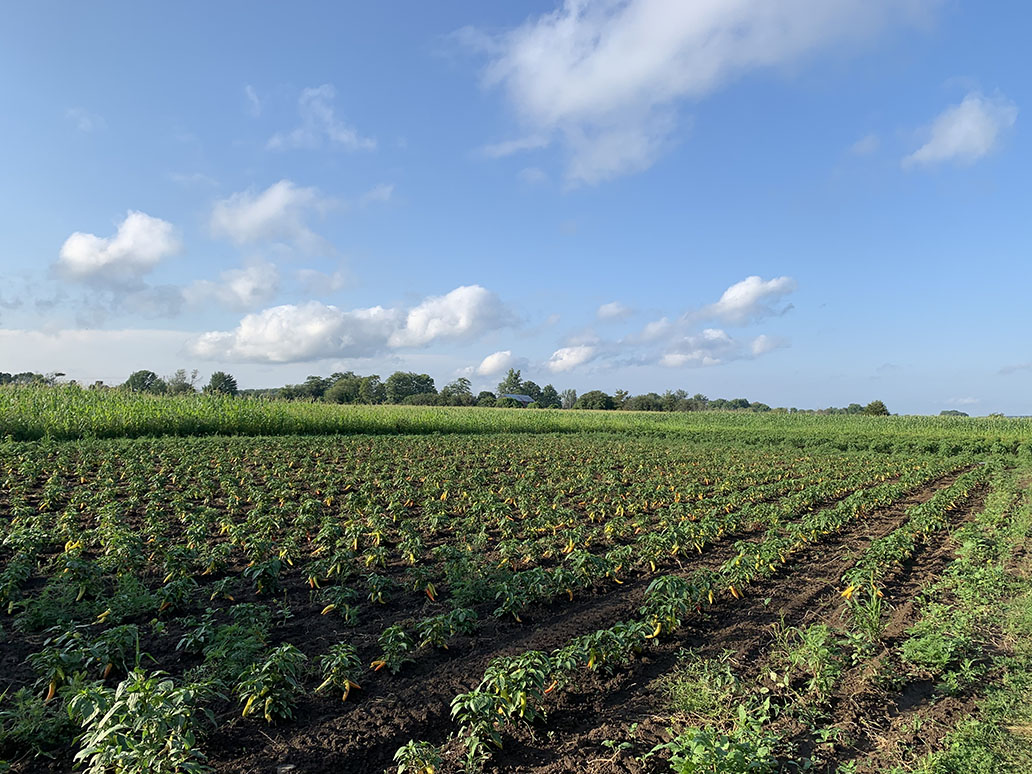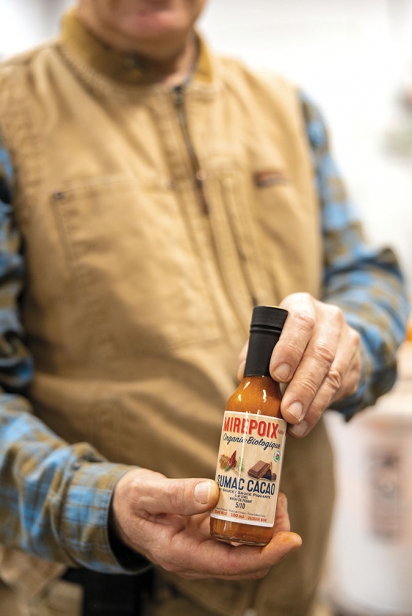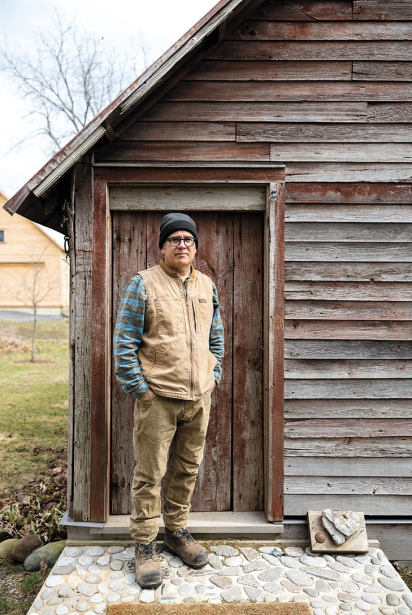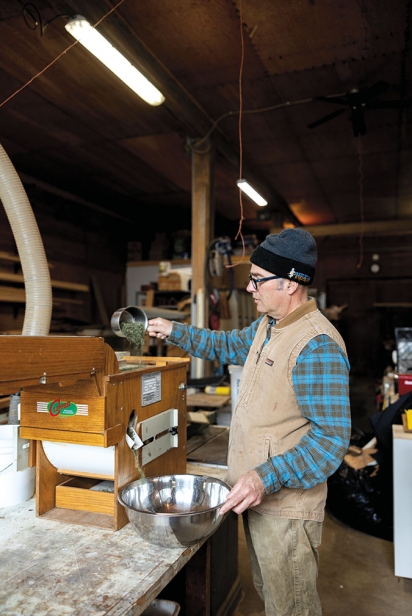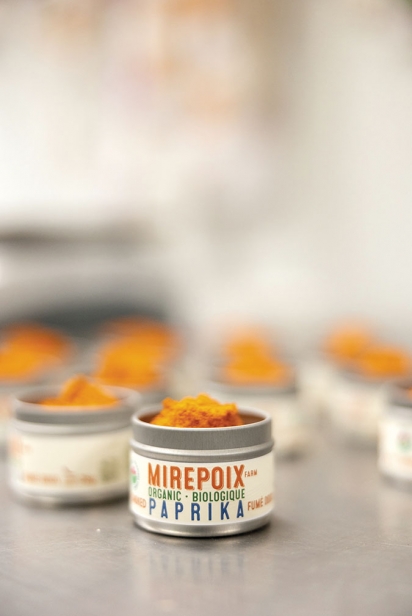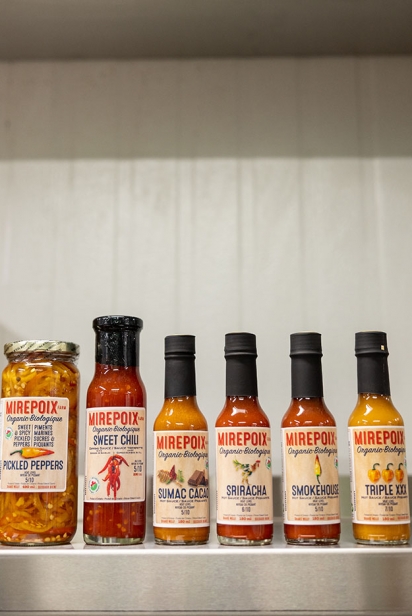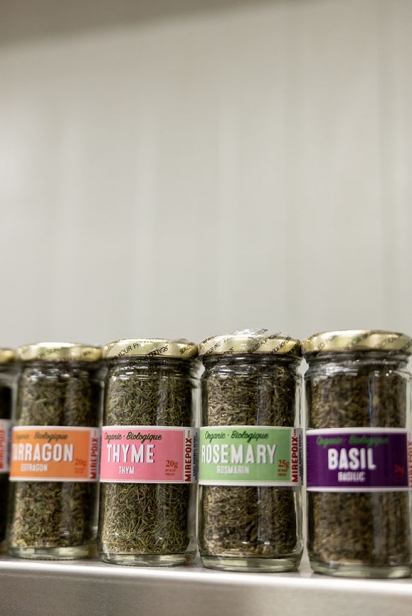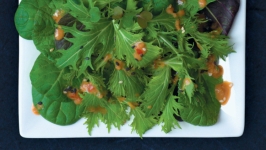Farming for Flavour
Necessity, it’s said, is the mother of invention, and it’s also a key ingredient in hot sauce. Tim Noxon and his (now former) wife, Vicki Emlaw, had a small-scale organic farming operation in Prince Edward County that was known as Vicki’s Vegetables.
“We grew hundreds of varieties of vegetables,” Noxon says, including many peppers. The couple soon realized peppers were “hard to sell in the vegetable market in Ontario, because a lot of hot peppers grow really well here and we couldn't sell enough of them. Hot peppers came in September, and you had a few weeks to get rid of them all.”
The peppers were a symptom of the business’s problematic seasonal nature. “To make that business sustainable year round, we needed to do some value-added processing,” Noxon recalls. “One solution was to process them into bottles or dried product, so we've focused on making hot sauces and dried herbs.”
When the couple split in 2018, “the value-added products were kind of my baby. I wanted to keep it going.”
He moved to a new location, on the shores of East Lake near Picton in Prince Edward County, “and it's worked out really well.”
His business is Mirepoix Farm and he’s a grower of vegetables and maker of “classic culinary herbs, sauces and condiments” that are certified organic and almost entirely “grown right here on the farm.” He uses apple cider vinegar and honey from elsewhere in Ontario, cane sugar from Brazil, sea salt from Portugal and olive oil from Greece. “Apart from that, everything’s grown here — peppers, onions, garlic, herbs.”
His own history in this verdant county goes way back.
The county has a history of Loyalist settlement, and Noxon says his own ancestors arrived from New York state in 1792.
“My great-great grandfather was born into a family of 13 kids in Bloomfield, and, at that time, there wasn't a lot of opportunity here,” Noxon says, as he sits in the workroom he built for himself in a building that once stored apples from orchards that then grew nearby. The workroom looks, as workrooms often do, like a jumble, but an orderly logic begins to reveal itself soon enough — in the spiral arrangement of labels for his products that Noxon designs himself, and in the stacks of boxes of bottles full of sauces, herbs and spices in various stages of production.
“There was no railroad here and he was a pretty industrious guy,” Noxon says of his great-great grandfather, “so he and his brother went to Ingersoll where there was a railroad and they started the business producing farm-implement equipment.”
Later, the family moved to Toronto, where his grandfather started an architectural accessory manufacturing business with a forge workshop and showroom on Yonge Street. Noxon’s father morphed it into a manufacturer of corporate furniture for boardrooms, airports and the like.
“My inspiration was to do a lot of work in that sort of building world, and I did for about 20 to 25 years. Then I met Vicki and we started farming together and being outside and working in the fields was, you know, nothing better. One thing led to another and then we had a pretty successful organic vegetable market garden business for 15 years.”
These days, Noxon sells only a few vegetables directly to a few restaurants. He’s focused on his bags of herbs, bottles of sauces and tins of spices, including chili peppers, and a sweet, smoked paprika that has an aroma as rich as the soil in which the peppers were grown.
“We grow them, dry and dehydrate them here, smoke them with natural wood smoke, grind them up,” he says. “For the paprika, I was doing an Italian pepper, which was a great tasting pepper, but it had so much sugar that the paprika would clump. I’ve switched to a traditional Spanish pepper to reduce the sugar content.”
If only farming were that simple.
“The Spanish pepper is harder to grow. I don't get a lot of peppers off each plant, and it's a really long season, which sometimes we don't have. So I've been doing simple breeding and selecting the right plants to try and adapt the plant to our climate.”
He also sells a selection of “traditional culinary French herbs,” including rosemary, thyme, sage and others. His hot sauces vary, but generally have enough heat to be stimulating, but not to shoulder out other flavours. “I want to have something that you can add to the food that makes it taste great, and you can still enjoy the food.”
He doesn’t go for the novelty names of so many hot sauces — infamous examples seen in Ottawa stores have included “Screamin’ Sphincter” and “Slap My Ass and Call Me Sally.”
Noxon knows that true quality doesn’t need lame comedy to sell. His sauces are often named for key ingredients or profiles, such as sumac, peri peri or sriracha.
None of this makes it easy to survive in a hyper-competitive condiment market. “I’ve been really trying to remain as local and small-scale as possible.”
His determination is fuelled by his dedication to the land that he loves. His contentment glows as he talks about the farm and walks through his workspace and kitchen. The farm owners do not farm, and rent only to organic growers, including four acres and a few outbuildings to Noxon, and another plot to Noxon’s partner, Sas Long, who grows flowers for wholesale and retail, under her company, Flora Lora Flowers.
Noxon is restoring a century-old barn next door, with skills from his years in carpentry and woodworking. His workshop and kitchen are in the former apple storage barn, where he still makes use of old cider bottles and baskets.
“It's a spectacular place and I feel very fortunate to work here.”
Noxon is focused on his organic, bio-farm methods, which he talks about as he checks an exterior trailer in which several baskets of peppers wait for processing, and an interior chilling room, where 27-litre buckets of various types of peppers are fermenting. Fermentation preserves the product, extending the farm’s business season while enhancing flavour and the shelf life of his final products.
“A lot of hot sauces are processed from fresh vegetables and vinegar is used as the stabilizer to give shelf life. I don't want to take away from the flavour of the peppers by adding a lot of vinegar, so making it more acidic through fermentation means less vinegar. Big brand names have a lot of vinegar in them.”
That’s not all that’s in some big-name brands, according to Consumer Reports magazine, which recently reported highlevels of arsenic, cadmium and lead in some imported spices.
“Being an organic grower, I'm not surprised because I think the overall population has no idea what's in their food,” Noxon says.
His farm is certified organic by Ecocert Canada. He uses ozonation in the farm’s water systems, and when “green manure” is called for to replenish the soil of his acreage, he uses cover crops grown by others on the farm. He’s won Ontario’s Premier's Award for Agri-Food Innovation Excellence, though his great reward comes daily, out on the land.
“I love being on in the fields. I love being on a tractor. I love that we do the whole process — save the seeds, plant the seeds, raise the plants and transplant them. We harvest the product, process it, bottle it and put it in boxes for shipping. And I love the kitchen part of it. I've always loved to cook and I appreciate good food. I lived in a remote part of Africa for a year, and that opened my eyes to how lucky we are in terms of food and drink where we live. Extremely lucky.”
Mirepoix Farm
mirepoixfarm.ca | @mirepoixfarm
Find it at: Agrarian Market, Vickie's Veggies, Zest Kitchen, The County Cider Company, Fawn Over Market, Lighthall Vineyards and online.


